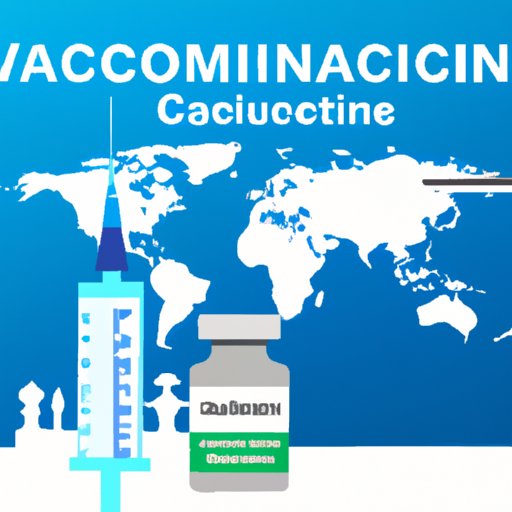Introduction
Traveling abroad can be an exciting and rewarding experience, but it’s important to understand the safety risks associated with certain destinations. One way to protect yourself is by researching and obtaining proof of the necessary vaccinations for the country you are visiting. The term “proof of vaccination” refers to the documentation that proves you have received the recommended or required immunizations for a particular region or country. In this article, we will explore what proof of vaccination is needed for international travel and provide a guide to help you prepare for a stress-free trip abroad.
Exploring Vaccination Requirements for International Travel
Before you go on any international trip, it’s important to research the vaccine requirements of the country you’re visiting. Different countries may have different requirements, so it’s essential to check the local government website or contact the embassy of the country you are visiting for the most up-to-date information. Knowing which vaccines are needed for travel can help ensure you stay healthy and safe during your trip.
What to Know Before You Go: Vaccine Requirements for Travelers
According to the Centers for Disease Control and Prevention (CDC), some countries require travelers to provide proof of vaccination against certain diseases before they are allowed entry. Examples of these vaccinations include yellow fever, measles, mumps, rubella, polio, and typhoid. It’s important to note that even if a country does not require proof of vaccination, it’s still a good idea to get vaccinated to protect yourself from illnesses like the flu or hepatitis A. Additionally, some countries may require a certificate of vaccination as a condition of entry.
Vaccines Needed for Safe International Travel
The World Health Organization (WHO) recommends that travelers be up-to-date on routine vaccinations, such as those for measles, mumps, rubella, diphtheria, tetanus, and pertussis. Additionally, depending on where you are traveling, other vaccines might be recommended or required. For example, if you are traveling to a country in Africa or South America, the CDC recommends that you get a yellow fever vaccine. If you are going to a region where rabies is common, you may need to get a rabies vaccine. Other vaccines that may be recommended for international travel include hepatitis A, hepatitis B, Japanese encephalitis, meningococcal disease, and pneumococcal disease.

The Essential Guide to Vaccines for International Travel
When planning an international trip, it’s important to consult with a healthcare provider who can provide advice on which vaccines are needed. This guide provides a comprehensive list of the vaccines that may be necessary for safe international travel.
Vaccinations Needed for a Stress-Free Trip Abroad
It’s essential to consult with a healthcare provider before you go on any international trip to determine which vaccines are needed. Depending on the destination, the following vaccines may be recommended or required:
- Measles, Mumps, Rubella (MMR)
- Diphtheria, Tetanus, Pertussis (DTaP)
- Polio
- Hepatitis A
- Hepatitis B
- Influenza
- Typhoid
- Yellow Fever
- Rabies
- Japanese Encephalitis
- Meningococcal Disease
- Pneumococcal Disease
Additionally, some countries may require additional proof of vaccination. For instance, if you are traveling to Saudi Arabia, you may need to show proof of vaccination against meningococcal disease. It’s important to check the requirements of the specific country you are visiting and obtain any necessary vaccines before you depart.
Conclusion
Traveling to a foreign country can be a thrilling and rewarding experience, but it’s important to take the necessary precautions to ensure a safe and healthy trip. This article has provided an overview of the vaccination requirements for international travel and a comprehensive guide to the vaccines needed for a stress-free trip abroad. Make sure to consult with a healthcare provider and obtain proof of any necessary vaccinations before you depart.
(Note: Is this article not meeting your expectations? Do you have knowledge or insights to share? Unlock new opportunities and expand your reach by joining our authors team. Click Registration to join us and share your expertise with our readers.)
